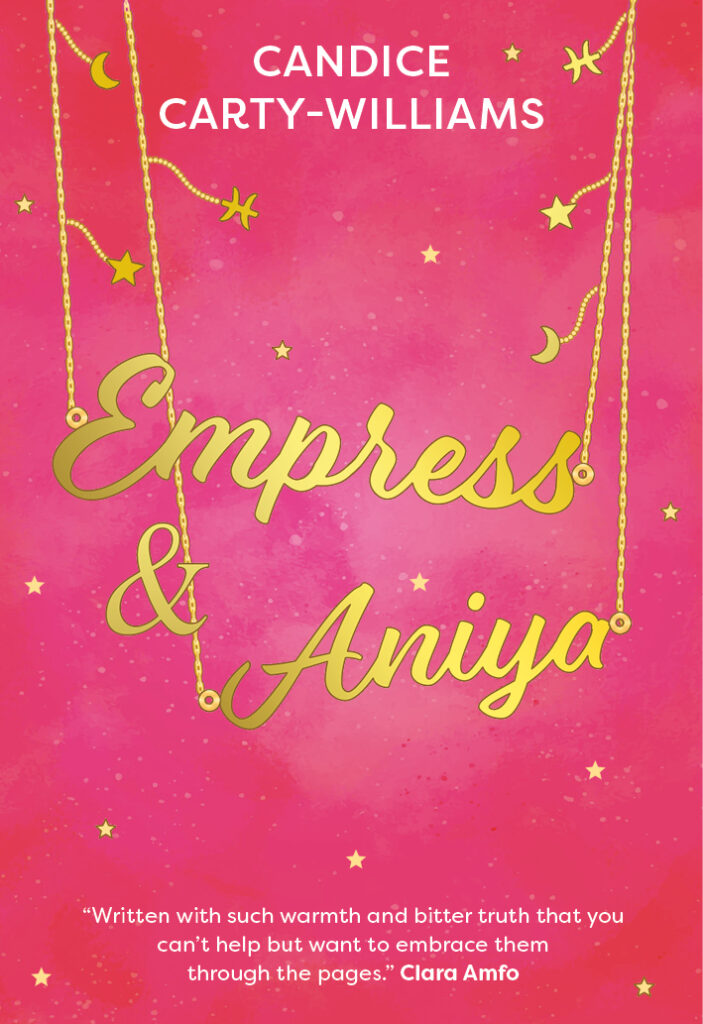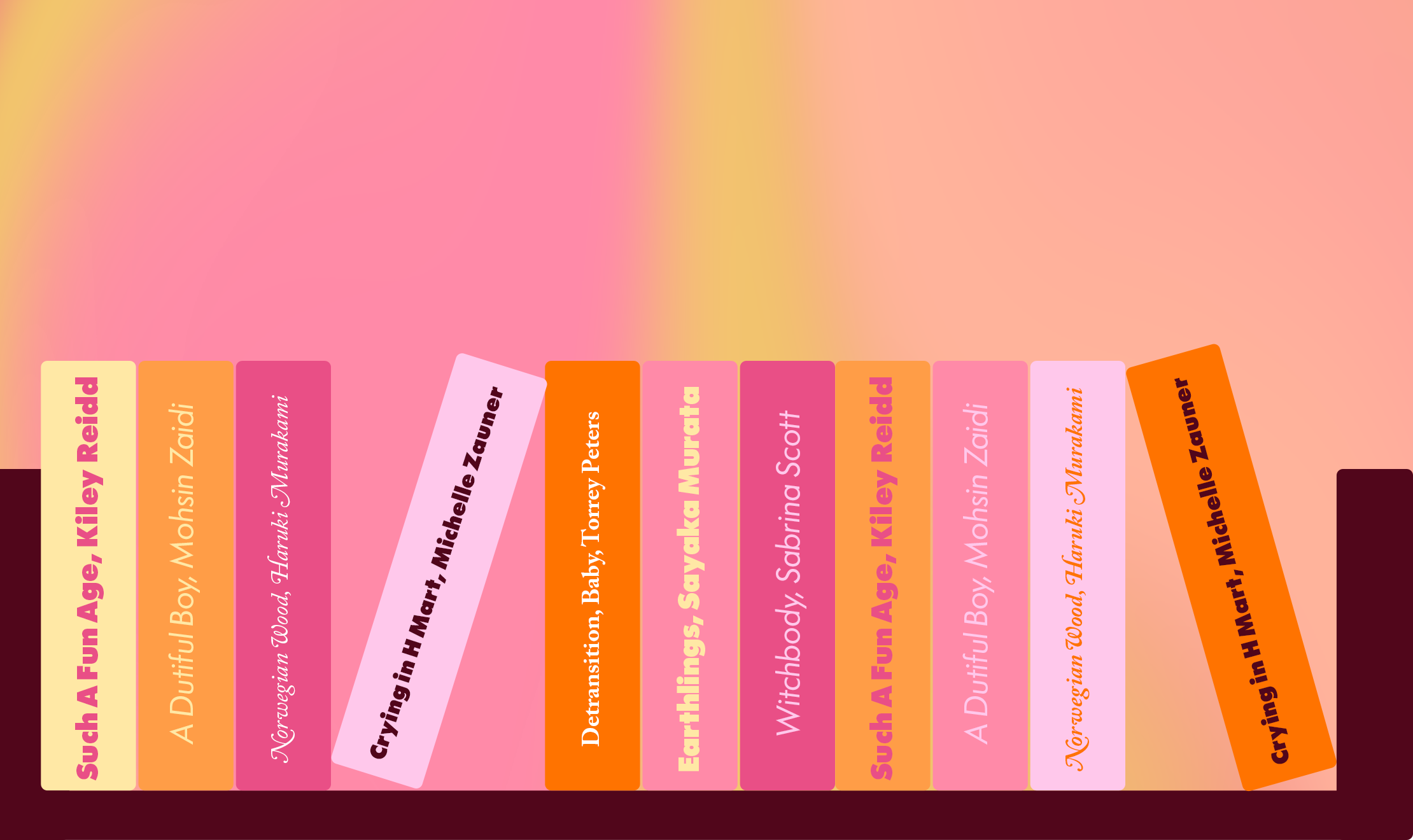
Ekua King; Canva
Bucket baths, bust down shoes and belly grumbles: Empress & Aniya is Candice Carty-Williams’ teens revisited
The new YA novel is so much deeper than a body-swap comedy.
Liv Francis-Cornibert
18 Oct 2021
Dubbed South London’s answer to body-swap comedy Freaky Friday, Candice Carty-Williams’ new YA novel Empress & Aniya feels like exactly the kind of book I would have lapped up on the floor of my local library’s YA section. Yet it speaks to a younger me in a far more intimate and healing way than I would have been able to recognise when I was the protagonists’ age. What I might have simply read as a fun and relatable book as a teenager now feels like returning and tending to that buried inner child.
Describing her first novel Queenie as firmly adult fiction, Candice is incredibly self-aware and clear about her position in the YA space – “I am a visitor” she repeats, in an interview over Zoom. “I’m not here to try and be like, ‘yeah this is my thing now’, but I also knew that I wanted to talk to my teenage self in some way.”
“I knew that I wanted to talk to my teenage self in some way”
Candice Carty-Williams
We meet Empress and Aniya, two 15 year old girls from very different socio-economic backgrounds, on Empress’ first day at the prestigious Chancellor School for Girls in South London. In a scene that feels all too familiar, latchkey kid Empress does the mental maths to determine how much she can afford to spend on lunch, when carefree Aniya beckons her over to her table. In a lunchtime scene reminiscent of Mean Girls, Empress finds herself seated amongst Aniya’s unwelcoming friends, who press Empress on answering questions she’d rather not answer.
The door to a beautiful friendship later opens when Empress’ groaning stomach betrays her hunger, and Aniya invites her round for dinner, starting a nightly routine. The girls quickly learn that they share the same birthday and organise a joint birthday sleepover. Before the clock strikes midnight, Aniya proposes that they try a spell from the internet, successfully completing it only to wake up the next morning in sheer panic because they have switched bodies.
Catching up with Candice on a Friday afternoon, she tells me that she was worried about how she would write YA fiction, but ultimately wrote what she would have wanted to read. The novel feels authentic because she wrote it with the intention of speaking to her teenage self, and has been acquainting herself with her teenage mindset in order to write in a meaningful way. “The whole journey of looking at my teenage self has been very healing,” she says. In an unlikely friendship, Empress is exposed to a world vastly different to her own, just as Candice, who says she was “very much an Empress at school”, describes “learning through osmosis” during her formative years.
“The whole journey of looking at my teenage self has been very healing”
Candice Carty-Williams
We speak fondly about that unique experience of having friends – financially stable friends who had knowledge and cultural capital – who brought us into their worlds without knowing just how special that was. “I went to a posh school in South London and a lot of us got in because they had to take certain social demographics [in]. So I was always around people in class who were really middle class and mostly white and obviously they become your friends,” Candice reflects as we laugh about her younger self marvelling at the variety of spreads and conserves available for breakfast at one such friend’s house, revealing the concept of having a choice – something she was unfamiliar with as a teenager
It is clear from the outset that this novel is a heartfelt offering to her teenage self and other young girls just like her. “I’ve been asked ‘where did you come up with this idea?’ and it’s like… I was living it for ages. I wished I could swap with all the people that I knew who had a better life than me,” she says. “It wasn’t because their families were financially stable, it was that they had a family at all. I didn’t really know what that was.”
Reminiscing about the joyful and fond memories of my secondary school years, it’s impossible to not see my teenage self in Empress, and many of my close friends and their parents in Aniya and her family. The teachers who notice more on your plate, and the ones that don’t. Being embarrassed about your house. Bucket baths. Trying not to draw attention to yourself, your bustdown shoes or your old blazer. Pressing your stomach before it grumbled in class. It taking so much more to get to school each day in comparison to your peers.

Reading the book reminded me of a dear friend of mine, who is still one of my very best friends today, and how her family constantly showed me care. Candice names similar people in her life throughout our conversation, expressing gratitude and deep awareness of the numerous people who have helped her, without whom, she would not be where she is today. It brought back memories of my own upbringing and the many aunties, teachers, childminders, friend’s parents and more who spared a few kind words, took me on trips with them, let me stay a little longer when my mum was late to pick me up: the village it took to raise me.
“[The book] brought back memories of my own upbringing and the many aunties, teachers, childminders, friend’s parents and more”
The safety of Aniya’s world stood out most to me – parents who communicate with her, make clear that she can rely on them and above all let her focus on being a kid. For all its silly moments and teenage angst, Candice expertly weaves the reality of Black girlhood shadowed by adult responsibility into the novel with care. “No one ever sees Black women as kids. ‘Just be strong. Just endure it. Just don’t accept help and cope with it,’” she says, reflecting on the oft-repeated language afforded to young Black girls. “At every single age Black women are taught to refuse help – to weather the storm. No. You can be just as vulnerable as your white counterparts.”
Empress & Aniya does not explain or ask for permission. It simply depicts the reality of many young Black girls’ lives in which the hardship is a part of, rather than the focus of, the story. It holds these uncomfortable truths delicately without shying away from them and still manages to be heartfelt, tentative, warm and funny. When I ask about her favourite part of the book, Candice recounts baby brother Leon reaching out and touching Empress’ face at the end of the novel, and wanting to show that “kids just know. They know love and who loves them. They deserve all the love”.
“Empress & Aniya does not explain or ask for permission. It simply depicts the reality of many young Black girls’ lives in which the hardship is a part of, rather than the focus of, the story”
The ending is a far happier one than most of the Jacqueline Wilson novels I grew up reading, and yet its construction was simple. For Candice, the only aim was for Empress to be safe. This is a particularly poignant moment during our conversation as we both realise the gravity of that simple desire.
“I wasn’t able to advocate for myself,” Candice says, comparing herself now as an adult to Aniya’s mum, Dawn, who fiercely advocates for her daughter. “If I had a daughter, she’s doing everything that she wants to do. That’s not a question.” We ultimately resolve that safety is not controversial, and neither is the ending of Empress & Aniya – it feels like full circle healing. The simple act of friendship changes Empress’ life as well as her family’s, just as all of the people who helped us changed ours. “I know that I will always do what I can to help people, because I know what it’s like to be helped and it could change and also save someone’s life,” says Candice.
Empress and Aniya is about so much more than taking the adage ‘put yourself in someone else’s shoes’ to a new level. It is a remarkably short, sweet and, above all, moving depiction of being a Black teenager in South London, all of the trials and tribulations that come with that unique period in life and, most importantly, girlhood and friendship. Candice effortlessly captures that world in a matter of 150 pages and allows us to look back with fondness at all of the joy and fortune that came with those moments. The only thing I could have asked for was to be a part of Empress and Aniya’s world for a little while longer. Readers will be hard pressed to not read the book in one sitting, laughing and welling up at other times, just as I did.
Candice Carty-Williams will be in conversation with Charlie Brinkhurst-Cuff at the London Literature Festival at the Southbank Centre on 23 October.









